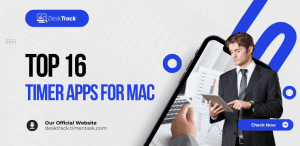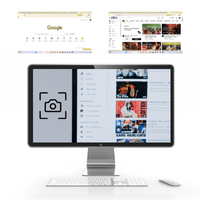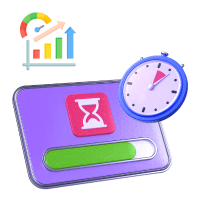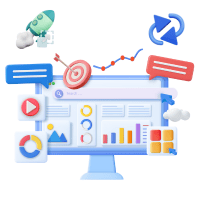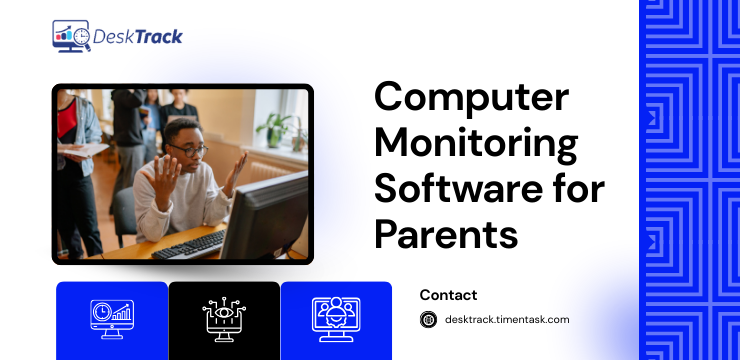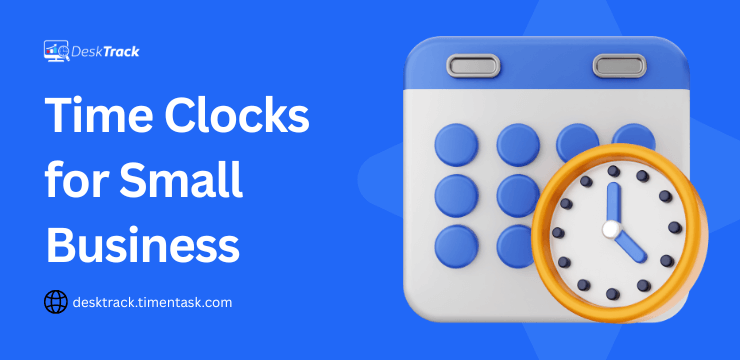Employee Performance Tracking is more than just keeping tabs on work hours these days. In today’s flexible and modern work environment, identifying employee output is the key to success. We recommend using performance measuring software for the best results.
Tracking your staff for performance, efficiency and productivity is essential with the continuously changing and complex work atmosphere. Performance tracking helps you conduct a better workflow, identify the best employees, and devise a plan for optimization and improvement.
Monitoring your staff’s performance and work progress gives you a 360-Degree perspective of work behavior, trends, patterns, work time utilization, and more. Want to learn more? Let’s get straight into today’s guide.
Fundamentals of Employee Performance Tracking
![]()
Employee Performance Tracking refers to monitoring your staff’s work time utilization, dedication, output, and of course, whether their overall performance is adding to your company or not, on the basis of your organization’s KPIs and objectives.
Different Models of Performance Measurement
In the current work environment, we track employee performance using many performance measurement models. Let’s see how these work.
KPIs
First and foremost, key performance indicators or KPIs. These are the starting lines of employee performance tracking measurement. KPIs are performance metrics you match against a specific objective, which is used to set benchmarks against competitors’ standards.
Balanced Scorecard
This method of tracking employee performance is a framework, involving measurement throughout your organization’s different departmental work, including finances, customer satisfaction, internal operations, growth and learning. Overall, this provides a comprehensive performance insight on your organization’s work.
Six Sigma
This method of performance tracking involves the evaluation of data to improve quality of processes and work. Furthermore, gap elimination and variability removal also follow as a result.
Performances Appraisals
This method of employee performance tracking is the best way to identify strengths and weaknesses. This formal evaluation for individual employees is used to keep the strengths and improve pain points to perfection.
Surveys
What better metric for manually tracking employee performance than to let your customers do it? Conducting surveys lets you know what your customers feel about your products or services. This paves a way for customer loyalty and gaining more new clients.
Setting Milestones
We always say that if someone is doing something better, then adopt and adapt it. This factor related to employee performance tracking is doing just that. Setting benchmarks for employee performance based on industry standards or best practices is the first step. The second step is to do it better.
ROI
The most essential tracking metric is return on investment. It’s why you are doing it, right? Because you need more ROI. A good performance tracker can help you set the standards for accurate measuring.
Setting Up Performance Indicators
Out of all the metrics, KPIs are the ones that drive performance forward. Ignoring these can be a mistake. However, we won’t let you by guiding you on how to track employee performance by setting KPIs.
- Firstly, it is essential to set clear objectives and goals. Think of it like how you will run a race, if you don’t know where the finish line is.
- Connect key results to these goals.
- Review the work status on a daily basis. Each current task must be finished before starting a new one.
- Train your employees on using a good employee productivity tracker.
- Use a productivity score. It’s as simple as that.
- Visually evaluating performance is much better than just showing text.
- For the employees who need improvement, we recommend 1:1 meetings.
Tools and Technologies in Performance Tracking
![]()
Which one of these will you choose? Manually tracking performance or automatic. Well, of course you will go for the latter, that’s why you are reading this section on employee performance tracker tools.
These are tools and technologies, which simplify and enhance performance tracking. Implementing these eliminates the room for error and gives the most accurate, pinpoint performance metrics.
Comparing Top Staff Performance Tracking Tools
Below are the top players in the employee productivity tracker software industry.
- DeskTrack
- Clockify
- Insightful
- TimeChamp
- Harvest
DeskTrack
DeskTrack is the best employee productivity tracker software, which has the most useful features for employee monitoring and performance evaluation. It’s a productivity monitoring as well as time tracking application. Overall, it’s your all-in-one solution.
Clockify
Clockify is a free employee time tracking software, which focuses on time management and the work time utilization level of your employees. You can create automated timesheets and optimize work management with the application.
Insightful
Insightful is a team analytics and productivity monitoring software solution. It’s a data-driven application, which is useful for turning reports into actionable solutions. These kinds of techniques are good for increasing productivity.
TimeChamp
TimeChamp is a great choice, when it comes to showing performance metrics visually through charts and other eye-catching elements. This, naturally, gives a better understanding of values than just plain text.
Harvest
Harvest is a time tracking and management application on our list. What makes it good is that it offers easy report generation and invoice streamlining through automatic billable and non-billable hours calculations.
Integrating Performance Tracking into HR Systems
So far we have read till the benefits, and some essential details on performance tracking. The next element of the process is integrating it into your HR Systems. Today, we will see an overview of it.
Implementing employee performance tracking to your HR Processes makes the job simple and streamlines it with ease of access. For instance, evaluating the accurate performance metrics will let your HR manager know the better requirements to improve work quality and productivity.
Methods for Effective Performance Tracking
Employee Performance tracking is not just a single dimensional 1-approach works for all concept. Hence, there are various methods to evaluate employees, each suiting to the various preferences, work-style, and behavior of your staff. Below we are mentioning our best 3 picks of them.
Quantitative vs. Qualitative Metrics
One effective way to track employee performance is to balance quality and quantity metrics. Here’s the bottom line, compromising one for another will surely bring you a lower output in terms of efficiency and productivity due to poor performance.
Continuous vs. Periodic Evaluation
An essential part of employee performance tracking is evaluation. There are 2 methods of evaluation, one is continuous, which to some employees may feel like daily nagging. Another method is periodic evaluation, which suits almost all employees.
However, this may also not work for some staff members. So, what’s your optimal solution? Make a hybrid evaluation method, which will surely work for everyone.
Self-Assessment and Peer Reviews
These two methods are the best in our list. Self-assessment involves only the employees themselves, which can get overwhelming. However, using a staff performance tracker tool will enhance this method.
On the other hand, reviews from your own colleagues or seniors work better, unless the staff takes it otherwise.
Read Also – Top 10 Time Tracking Apps in 2025
Performance Tracking and Employee Development
Let us ask you a question. What if your employee (s) started at 100% and after 5 years are still at 100%, will they and your company develop? That’s why we keep the “track employee performance” rule as mandatory for employees’ growth and development.
Based on the individual performance insights, you can create curated training programs to boost your employees’ performances. We recommend implementing a good performance tracker tool to get the most accurate metrics. These values are also helpful in making the right career path for your employees and planning ahead for success.
Legal and Ethical Considerations
Employee performance tracking software is good for your organization’s productivity. However, some employees may also consider it a privacy breach. You should ensure that there is 100% clarity between you and your team before implementing such software.
Furthermore, your employees must be aware and must completely agree that performance tracking is for their own good. Also, you must comply with the legal rules and regulations of your country or state before considering such steps.
Case Studies on Employee Performance Tracking
Still not sure whether employee performance tracker tools are right for you? Let us clear your doubts with real-life examples.
Success Stories from Various Industries
Let’s see 2 success stories first to understand better, how performance tracking can work for you.
CPA Firm
BakerTilly, a CPA Firm, was facing an issue with their outdated performance tracker application. However, when they switched to a new and better version, then they experienced 100% completion, 10 times more projects, and decrease in turnover time.
- This concludes that sometimes you just need to get a better employee tracker software such as DeskTrack.
Manufacturing Firm
Fossil Group, a manufacturing group has been sticking to paperwork and manual monitoring for its around 15000 employees for many years and facing issues with employee satisfaction. However, when they switched to an employee performance tracking tool, the change was significant.
- This simply concludes that using employee performance monitoring will lead to employee satisfaction.
There are many more success stories. However, we can’t mention them all here. Overall, employee performance monitoring will benefit you in all aspects of your organization.
Lessons Learned from Failed Tracking Implementations
Not all track employee performance programs were successful. However, learning from failed implementations is also essential. Let’s discuss them below.
- Bad planning is the first reason employee monitoring fails. Thus, setting clear objectives is essential.
- Overloading your employees with too much tracking can also lead to failure. It should never hinder the daily schedule of your staff.
- Not testing the employee performance tracker software before implementing it can lead to failure. Thus, checking whether the software is working for your company or not is essential.
- Not training your employees on using the application can lead to failure. So, giving enough learning experience to your employees is also crucial.
So, now we know what’s crucial for successful implementation of employee performance monitoring software. Let’s move on.
Make Your Workday More Productive
Time tracking and work management can help you reach your goals faster.
Try 15 Days for Free

Best Practices in Performance Monitoring
To conclude this section, we will see some of the best and most trustful ways to implement performance tracking in your organization.
Establish 100% Clarity
You are already aware of this rule. However, we will still emphasize it. So, the bottom line is that without 100% transparency, your track employee performance program will fail.
Compliance
The employee performance tracker tool must not only adhere to the laws and your company policy. However, your employees must also agree with its terms and conditions.
Choose the right tool
You can’t just choose any software and begin implementing it. What if it doesn’t work as per your company policy, or it is hindering your employees’ privacy? We recommend choosing a good staff performance tracker application such as DeskTrack.
Monitor what’s Actually Necessary
This is crucial to understand that you are performance tracking your staff and not spying on them. For instance, if you are implementing the software to log the team member’s private conversation, then it will come under bad practice.
Challenges in Employee Performance Tracking
Using performance tracker tools is never a smooth sailing journey. Thus, facing challenges is common. Below, we have further elaborated this point.
- The most common practice is to have a hierarchical structure, when implementing performance management, for complete transparency and lack of confusion. This also results in better organization.
- It is also essential to understand the performance metrics in real time. Applications such as DeskTrack provide complete accuracy in this.
- Make performance management a habit by putting it into your regular task list. Over time, you and your staff will get used to it.
- Just seeing the performance metrics is not enough. However, giving regular feedback based on these, will be an actionable solution.
Now that this part is clear, how you can devise solutions to employee performance tracking challenges. However, you won’t face this situation where your employees will straight up agree to this scheme as this is 100% complex, completely new, and creates doubts about privacy safety.
We suggest you take as much time as you require getting your staff on the same page as you. Telling them every major and minor detail is the key to successful employee productivity tracker tool implementation.
You must also ensure that the performance tracking is 100% transparent and accurate. We don’t know about the former. However, for the latter, we recommend using DeskTrack.
Future Trends in Employee Performance Tracking
![]()
Although its market is unsteady, employee performance tracking is a growing industry, and we see a large market for it in the future. These trends will play a crucial role in the success of the sector.
The Role of AI and Machine Learning
AI and machine learning has already optimized employee performance tracker software and redefined how they work. As per the research, it will be implemented much properly in the future. However, we think it can affect how the software behaves. For example, minor inaccuracies.
Predictive Analytics in Performance Management
Another trend in performance tracking is reusing past performance metrics to forecast future values. For example, looking at the sales performance in week 1 to foretell the metrics of week 2. Although this has been going on even before performance management tools existed, these applications have made it even better and more accurate.
The Impact of Remote Work on Performance Tracking
Call it remote, work from home, or flexible working hours, it has been a big challenge in the performance tracker sector. Although, improvements have been made to synchronize remote teams. However, it still poses a challenge.
Conclusion
To conclude, employee performance monitoring is a good practice for employee growth and development. However, it comes with its own challenges, trends, and complexities. Thus, having 100% clarity with your staff is also crucial before implementing the best performance tracker for performance monitoring. Furthermore, it is also essential to abide by the laws and properly understand performance measurement models before implementing the best practices. We think, if used to the best potential with complete fairness and accuracy, your staff monitoring application will boost your employee growth to new levels. Still looking for the best performance monitoring software? Look no further than DeskTrack.
FAQ
What is a performance tracker?
A performance tracker is a software application, which aids companies in monitoring the performance of the employees. These tools help managers evaluate employees and suggest corrective decisions based on accurate performance metrics. Here are a few benefits of using these software.
- These applications prove helpful for employee growth and development as managers are able to provide continuous feedback based on accurate metrics.
- Employees gradually improve and add more to your company as they get real-time feedback.
- You experience increased productivity over time.
- Performance tracking software also creates more room for improvement and also creates a better career path for employees.
- Such software also help you create training programs curated to each employee’s requirement.
How to track employee performance?
Tracking employee performance has many steps and a clear procedure to it. This process must be followed for successful implementation.
- Setting clear goals and objectives is the foundation of a successful staff performance tracking structure.
- The next step is to match these objectives to key performance indicators.
- The next step is to implement other performance standards.
- Feed appropriate information into the staff performance tracker and start measuring efficiency and productivity.
- Keep giving regular feedback and taking actionable solutions for better performance.
What are the future trends in employee performance tracking software?
The market growth in the industry of staff performance monitoring software is growing rapidly. There are many small and big trends in this sector. However, these 3 patterns are the most discussed.
- AI and machine learning is being implemented in staff performance trackers to make them more optimized and add advanced functionality.
- Remote work is also becoming rapidly popular and implemented. Although tracking them is also possible with performance tracking software, it is still challenging due to the flexible timing.
- Predictive analysis, i.e., foretelling the future metrics by analyzing past data also becomes more accurate by implementing staff performance tracker applications.






